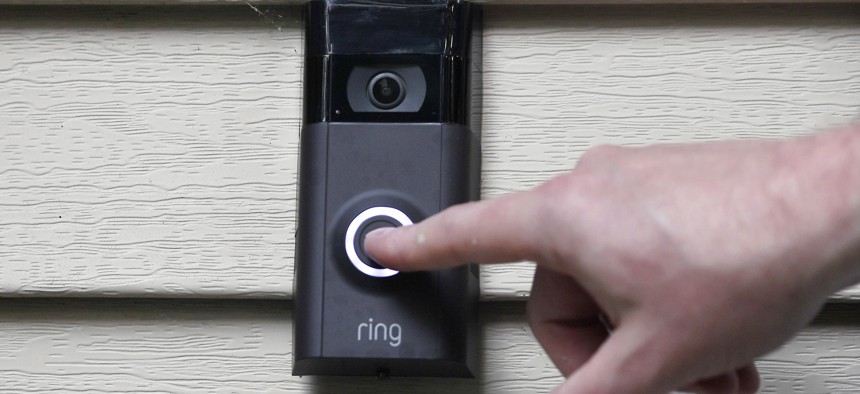Congress Investigates Amazon Ring’s Relationships with Local Police Departments

In this Tuesday, July 16, 2019, file photo, Ernie Field pushes the doorbell on his Ring doorbell camera at his home in Wolcott, Conn. AP Photo/Jessica Hill
The House Committee on Oversight and Reform asked Amazon to turn over copies of its agreements with hundreds of law enforcement agencies, as well as information about each time it provided camera footage to police.
Hundreds of law enforcement agencies in the United States have partnerships with Amazon’s home security company, Ring, which gives police the ability to request access to surveillance footage pulled from residential cameras.
Now Congress is probing the nature of Amazon’s relationships with local law enforcement, asking the company to turn over contracts that detail its level of cooperation.
The House Committee on Oversight and Reform sent Amazon a letter this week asking the company to provide contract documents outlining its relationship with all partner law enforcement agencies and local governments, as well as incident logs detailing each instance in which the company has provided videos to police departments.
“The Subcommittee is seeking more information regarding why cities and law enforcement agencies enter into these agreements,” Rep. Raja Krishnamoorthi, the chairman of the Subcommittee on Economic and Consumer Policy, wrote in the letter. “The answer appears to be that Ring gives them access to a much wider system of surveillance than they could build themselves, and Ring allows law enforcement access to a network of surveillance cameras on private property without the expense to taxpayers of having to purchase, install, and monitor those cameras.”
Ring, which was purchased by Amazon in 2018, sells home security systems that can include various amenities, such as doorbell cameras and motion-activated floodlights. Users are alerted when motion sensors notice activity and can view the live feed from their home’s security cameras. Video footage can also be shared on Ring’s public social network portal, Neighbors, which allows people to post information about crime and suspicious activity.
Ring said it does not give law enforcement direct access to footage from its network of home surveillance cameras. Rather, it allows law enforcement to request footage from users through the Neighbors portal, which they can decline to turn over. Law enforcement can also post their own alerts to the portal.
In August, the company disclosed that 405 law enforcement agencies were using the Neighbors portal. Today, more than 950 agencies do so.
Krishnamoorthi’s letter raises concern about the circumstances under which Ring provides video footage to law enforcement and whether there are any limitations on what law enforcement agencies can do with footage once they obtain it.
“Ring has asserted that it does not turn over ‘customer information in response to government demands unless required to do so to comply with a legally valid and binding order, such as a search warrant; or in an exigent or emergency circumstance,’” Krishnamoorthi wrote. “However, that assertion appears to contradict Ring’s Terms of Service, which indicate that Ring can turn over information in response to a ‘reasonable governmental request.’”
Amazon did not respond to a request for comment. However, Ring has previously said its technology can help make neighborhoods safer.
“By working together through Neighbors, users and local law enforcement have achieved amazing results time and again, from getting stolen guns off the streets to helping families keep their children safe,” the company said in a blog post last year.
As the number of law enforcement agencies tapping into Ring grows, it’s important to understand precisely how police are using the technology, said Jay Stanley, a senior policy analyst with the American Civil Liberties Union.
“The actual contracts are key because the cooperation between the company and police departments is one of the big questions here,” Stanley said of the oversight committee’s request. “It’s valuable to find out how things are being done in practice and to try and figure out what is happening across this very big and diverse country.”
In addition to requesting documents on law enforcement agreements, the oversight committee’s letter also asks for any internal Ring documents related to potential integration of facial recognition or license plate reader technology.
Reporters and researchers have compiled a trove of public records detailing Ring policies and outlining some of their agreements with local law enforcement, including promotional arrangements. MOUs obtained by researcher Shreyas Gandlur show that several police departments in Florida were given free cameras to distribute to residents based on the number of downloads of the Ring app in their jurisdictions.
Recent news reports have also raised questions about how useful Ring partnerships with local police are in solving crimes.
NBC News interviewed 40 law enforcement agencies that partner with Ring, and found “little concrete evidence” to support the company’s claims. Thirteen agencies said they had made no arrests based off of Ring footage while another 13 agencies said footage was used to make at least one arrest. The remaining agencies could not say for certain how often Ring footage was used to make arrests, or if it was at all.
The letter asks Amazon to brief committee staff on several related matters by February 27.
Andrea Noble is a staff correspondent with Route Fifty.
NEXT STORY: The Cannabis Industry Could Become the National Model for Labor Relations





